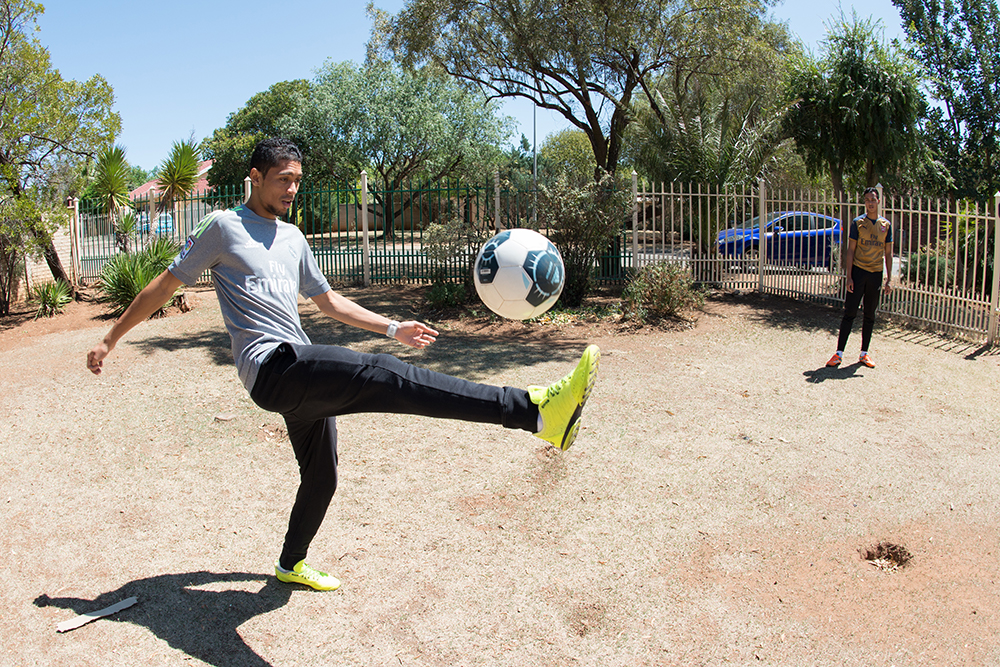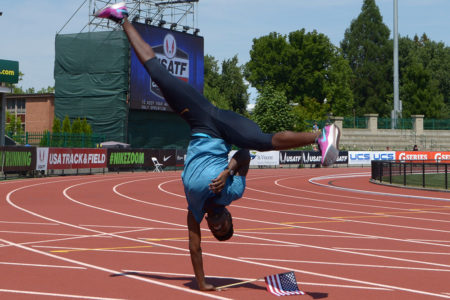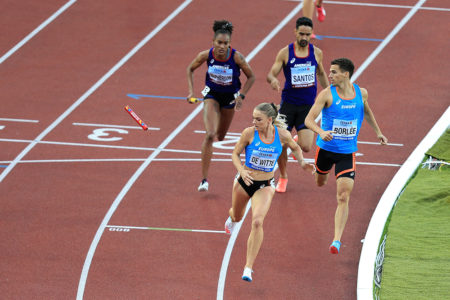Here’s this month’s collection of generally off-track activities that have gone a long way towards shaping the way the sport is headed:

van Niekerk Back Training Pain-Free
The World Record holder in the 400 is finally back on the track. After damaging his knee in a celebrity touch rugby match last fall, Wayde van Niekerk missed more than 10 months before he could return to running again as August ended. Coach Ans Botha says, “He was very excited that he was able to get the feel of the track without feeling any pain.”
Van Niekerk, the only man to go under all of the major barriers in the sprints: 10.00, 20.00 and 44.00, had torn both his meniscus and his anterior cruciate ligaments in his right knee. Botha notes that the recovery road ahead is still long: “We have a meeting with the medical team to hear what they suggest. That is, how far Wayde is from full recovery after the little track he did during the rehabilitation session in Doha last week.”
Bernard Lagat Eyeing A 26-Miler
At age 43, one of the greatest track runners ever is still looking for new challenges. The ’07 world champ at 1500 & 5000, Bernard Lagat is planning to run the New York City Marathon in November. No slouch these days—he has run 28:45 to win the USATF 10K title this season, and also clocked a 62:00 half marathon—the Washington State alum says he will be aiming to run with the leaders and play it by ear in the final stages.
“I want to go to New York and run as hard as I can and get in a good spot,” he told Sports Illustrated. “If I was able to get in there and finish top 5, that will be sensational and on top of that, if I can cross the finish line getting that American Masters Record [2:12:20] by Meb that would be a success on top of another success.”
As for his long-running motivation, he added, “I wanted a new challenge. I think I’ve been successful in my own way from a very good 1500 runner to now a 62-minute half-marathoner. I’ve waited this long and I’ve been able to make good preparation. Having now run a few half marathons and 10Ks, my interest was sparked. Now it’s ‘What can I do in a full marathon?’ I figured that now is the right time to try it.”
U.S. Athletes Chosen For Youth Olympic Games
The upcoming Youth Olympic Games in Buenos Aires might look a little bit like the Continental Cup with a squad of 7 U.S. athletes joining with their hemispheric peers to form The Americas team to compete against other continents. The track & field portion of the Games will run October 11–16.
The U.S. entrants, with their high schools and event:
Skylar Ciccolini (Mifflin, Lewistown, Pennsylvania) JT;
Malcolm Clemons (St. Mary’s, Berkeley, California) LJ;
Meghan Hunter (Provo, Utah) 400;
Charles McBride (Apex, North Carolina) HJ;
Athing Mu (Central, Trenton, New Jersey) 800;
Nicholas Ramey (Brookwood, Snellville, Georgia) 400;
Grace Stark (Lakeland, White Lake, Michigan) 100H.
Doping Charge For U.S. Long Jump Star?
Jarrion Lawson has been provisionally banned after testing positive for epitrenbolone, according to the Athletics Integrity Unit. The 24-year-old sprinter/long jumper is fighting the charge, saying, “Lab results have shown that there were extremely trace amounts of the metabolite in my sample. We are confident that we will prove that the metabolite entered my system through contamination. I am a 100% clean athlete and a big supporter of a clean sport. I am completely confident that a fair decision will be made in this case and I will be cleared of any wrongdoing.”
Lawson said the substance could have come from contaminated beef—Epitrenbolone is approved in the U.S. for cattle use.
Reportedly the positive arose from an out-of-competition test on June 2, although the Arkansas alum competed through July 22. For now, his suspension is in force until he has a full disciplinary hearing.
The Kenyan Money Pit
Corruption in Kenyan athletics continues to be an issue, with three stories hitting the wires in the wake of the IAAF’s awarding the ’20 World Junior (U20) Championships to the East African nation. First came news that an audit of the ’17 World Youth Championships revealed that about half of the government money that was allocated for the meet was stolen. The amount, some $1.7 billion shillings ($16 million US) vanished in a flurry of undelivered supplies and sloppy bookkeeping. No culprit has been identified.
In an unrelated case, Kenya’s David Okeyo has been booted from the IAAF Council and banned for life after the ethics board found him guilty of skimming funds from Nike’s scholarship deal with the Kenyan federation. Athletics Kenya treasurer Joseph Kinyua was also implicated in the scheme, as was former AK head Isaiah Kiplagat, who died in ’16. Finally, the ethics board cleared Okeyo and official Isaac Mwangi of extorting money from athletes in order to cover up positive doping tests, saying that it could not prove the allegations beyond a reasonable doubt.
Russian Medals: You Win Some, You Lose Some
Keeping track of Russian medals is a tricky business these days. Within the space of a week came news of two medals being upgraded while three others are going away. The IOC will be upgrading finishes by Ekaterina Poistogova and Tatyana Tomashova to silver medals at the ’12 Olympics because athletes ahead of them have been banned. Poistogova originally finished 3rd in the 800 while Tomashova (1500) originally finished 4th. Poistogova moves up because of the disqualification of her teammate, original winner Mariya Savinova. Tomashova moves up because of the DQs of the original Turkish 1-2, Aslı Çakır Alptekin and Gamze Bulut.
Of course, the galling irony is that both of the upgraded Russians have also served doping bans. Poistogova admitted in undercover video in ‘17 to using banned substances, while Tomashova was caught using someone else’s urine to evade a positive test in ’08.
On the flipside, long jumper Tatyana Lebedeva lost her ’09 Worlds silver. Teammate Maria Abakumova lost her ’11 javelin gold (and ’09 bronze). Both have given up the notion of further appeals to the CAS and reportedly “grudgingly accepted guilt.”
A Former Gold Medalist Comes Clean
The release of an autobiography by ’88 Olympic decathlon champ Christian Schenk has shed a new light on the East German doping program, admitting for the first time that he took drugs. “At first I denied ever having taken banned substances,” Schenk says. “Then I settled for the legally softer answer, I had never knowingly doped. Both were lies. For me that was like reaching the next level, almost a tribute. Getting the pills meant I was on the squad and expected to perform well. In [training camp in Bulgaria] I experienced a variety of pills being poured out on the plates of the athletes during mealtimes. “We called them Smarties, but we did not know exactly what we swallowed—it was supposed to be vitamins and minerals.”
Schenk is not facing any loss of honors, however. An IOC spokesperson said, “According to our statute of limitations, the IOC in this case—as in similar cases—will not follow up. We welcome the admission and hope it will help clarify the situation and strengthen the fight against doping.”
Whither The World Relays?
With the Bahamian government saying that the financial burden of hosting the World Relays again in ’19 is too much for the small island nation (Last Lap, July), the search for a new site focused on Jamaica. However, some Jamaican officials worried that National Stadium would need substantial upgrades before hosting such an event.
Jamaican federation head Warren Blake seemed excited about the prospect. That is, until the federation failed to get any guarantee of financial backing from the government. “It is disappointing, but it is what it is,” said Blake. “If the government felt at this time it was hard, with the given economic situation, then that is it.” The cost, including stadium renovation, would have been over $5 million U.S.
So the search for a new host goes on… or does it? The IAAF website’s front page still has Nassau—which hosted the 3 previous editions of the meet, in ’14, ’15 & ’17—listed as the host. Wishful thinking?
A Pole Vault Absence Explained
USADA announced in late August that pole vaulter Demi Payne had tested positive for the banned steroid Drostanolone at the ’16 USATF Indoor and has been given a 4-year ban. In the U.S. Drostanolone is a controlled substance that can carry a $250,000 fine and 3 years in prison for possession. It is sold at some Mexican pharmacies without a prescription. Payne only competed in three meets after the test; in one of them—which created a fabulous photo—her pole exploded, injuring a tendon in her hand. She failed to make the Olympic Trials final.
Payne released a statement in which she says she gave up the fight against USADA after running out of funds and time. “Did Drostanolone show up in my system? Yes. Do I know how it got there? No. It’s as simple as that.”
She added that she intends to continue training with her eye on the ’20 Olympic Trials.
Turn Forward Those Japanese Clocks?
As noted in this space last month, a summer heat wave killed more than 125 people in Japan leading the president of the LOC to ask prime minster Shinzo Abe to consider implementing daylight savings time in order to shift the morning events earlier and dodge the heat during the Games. Abe is reportedly considering the move, including a 2-hour shift as a summer trial next year. Public opinion polls in early August showed 51% of Japanese in favor, with 12% opposed, although the nation has never used daylight savings time. Interestingly, South Korea never had either, except in 1987–88 to provide heat relief for the Seoul Olympics.
On the negative side, the governor of Tokyo said, “A lot of people are concerned about the cost and social instability caused by having it for just two years.” However, she indicated she would be open to discussing the move on a permanent basis. Indeed, a later poll came out that showed 53% of the populace opposed to the shift, with 36% in support. Perhaps more importantly, a Reuters poll claimed that 75% of Japanese businesses opposed any use of daylight savings time. □






